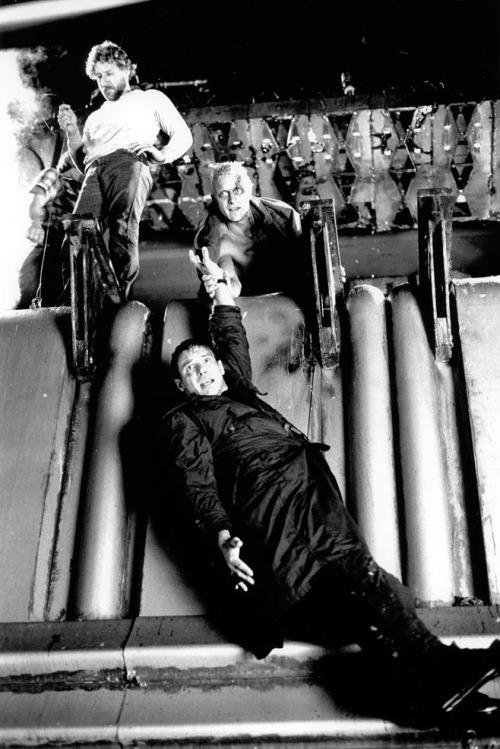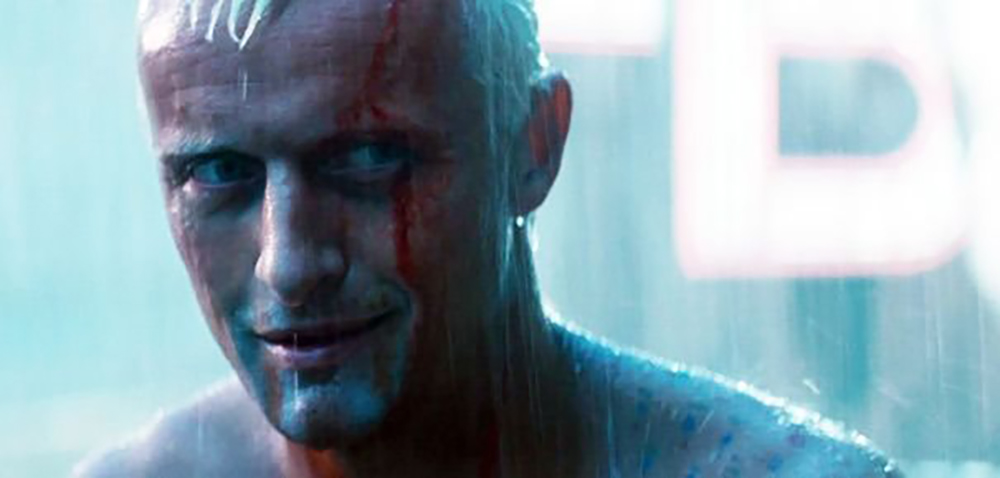Roy Batty (2016–2019)
“What we do in life, echoes in eternity.” is the most striking line in Ridley Scott’s Gladiator. Its pomposity and grandeur is inevitably reminiscent of every most important character’s vocabulary in all of Scott’s films. This is, naturally, an allusion to Roy Batty, Rutger Hauer’s brilliant interpretation in the legendary Blade Runner.
Associative and metaphorical, with pseudo-biblical tone, and inevitably akin to the allegory of Lucifer, Roy Batty remains one of the most striking fictional characters in the history of film, and art in general. He is a character to carry all of our fears.
Of the casting for Blade Runner, Ridley Scott said, “When I saw Rutger Hauer, I saw Roy Batty.” In spite of the initial underperformance at the box office and divided reviews, the enigma of innumerable thematic associations, the gloomy atmosphere achieved through the fusion of neo-noir and futurism, and the astonishing design and suggestiveness of Blade Runner, became fundamental in pop culture.

That year, the audience, as expected, massively favoured the more comforting Spielberg’s E.T. the Extra-Terrestrial. The elusive postmodern vision of Blade Runner, after its semi-success via video distribution, has acquired a cult following.
Yes, the movie is unimaginable without its literary source, Philip Dick’s novel Do Androids Dream of Electric Sheep?, without Hampton Fancher and David Peoples’ screenplay, the cinematography of Jordan Cronenweth, Vangelis’ soundtrack, Harrison Ford, the greatest star at the time, in his most introspective role, and, finally, without Scott making the rhythm and tempo of the film subordinate to the characters and the original concept… but all of that wouldn’t be as remarkable without Roy Batty.
Not everyone has favorably looked at the immortal role of Rutger Hauer. Pauline Kael called Hauer’s role hilarious, forgetting to notice that Rutger Hauer was, in terms of magnetism and mannerism, in many ways, comparable to her favorite charismatic style, the one of Marlon Brando. Roger Ebert struggled with Blade Runner for twenty years, and went from skeptical praise to finally including him in his selection of great films.
The absence of a solid storyline in Blade Runner put off many people. Nowadays, there are few who do not understand that the atmosphere carefully built to obsession and superb film design are the main assets of Ridley Scott’s inimitable style. Consciously limited storyline is also a characteristic of his first three films. After his debut, the impressive The Duellists, and the Alien phenomenon, Ridley Scott nailed one of the most influential films ever, and the one he considers to be his most complete and personal.
Before Blade Runner, Rutger Hauer had several films of relative success, including Paul Verhoven’s Dutch films and Nighthawks – a police thriller with Stalone. After Blade Runner, he got the lead role in the final installment of another fallen angel – Sam Peckinpah, the first screen adaptation of Robert Ludlum’s The Osterman Weekend.
In the second half of the eighties, his career was marked by The Hitcher and Escape from Sobibor, for which he received the Golden Globe award.
In the 90’s he might have unofficially become the Marlon Brando of a bunch of lousy films, but he shone in the role of Roy Batty. His android, a replicant, a machine, is an angel and a demon in one, the most exciting character in the film. He is all in dichotomies: fearsome and afraid, cruel and gentle, exceptionally smart, sad and witty, theatrical and articulate, desperate and angry. Yet, he is so deeply humane and the only one, in that world, ready for the act of forgiveness – the act that is disappearing nowadays just like Roy Batty’s tears in rain. The unforgettable final monologue was Hauer’s personal improvisation and the highlight of his career.
Blade Runner has long transcended the genre, and with this existential performance, Rutger Hauer has become eternal. The greatest irony is that he left the same year Roy did. This leaves us, the ordinary mortals, to offer new interpretations of Blade Runner, to seek out alien clues, and, in our ignorance, to mystify it.
Rutger Hauer and Roy Batty, unlike “all those moments”, will not be lost in time.
Djordje Maric



Masterful retrospective view of an undeniable masterpiece! A delightful treat to readers and film lovers. Bravo!
Теперь буду знать